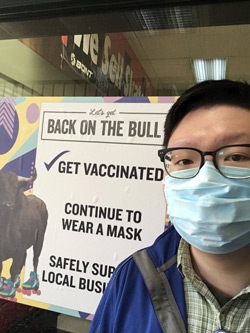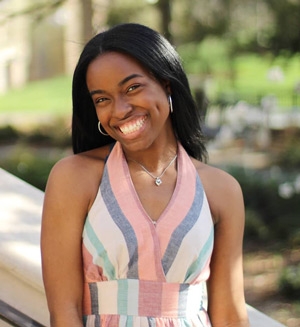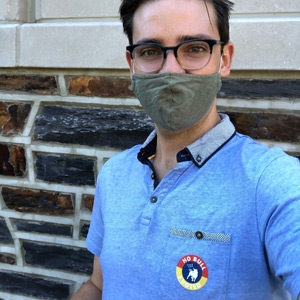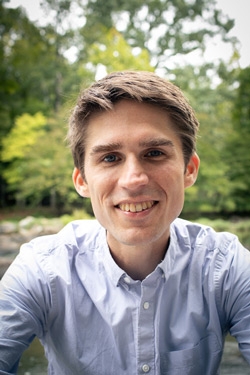Life During the Pandemic: Experiences from the Chapel Community

This is an article from the Summer 2021 issue of Chapel View magazine.
Andrew Raines, T ’21, was supposed to spend the fall semester in Germany doing research for his thesis, but the pandemic changed his plans. Instead, he went home to Olanta, South Carolina, and spent the semester working for his brother splicing fiber-optic cable and helping his mother process COVID tests at the local hospital.

In the spring, he returned to Duke to take online classes and reconnect with friends. A member of the Duke Episcopal Center, he participated in Chapel Choir virtual anthem recordings, met online with other Chapel Scholars, and preached in the Chapel for a Holy Week midday service.
“The people of Duke Chapel were there for me this semester and that was really important,” he said.
Raines was, of course, not the only person navigating a year of unanticipated challenges. Over the past year, the Coronavirus pandemic wreaked havoc around the globe, ending many lives and upending nearly all lives. The Duke Chapel community was affected by the pandemic in ways that were quite public—services shifted to online-only, access to the building was restricted, all gatherings were held on Zoom, longstanding ceremonies were made virtual, and the Chapel carillon tolled to mark the loss of lives. At the same time, the pandemic also shaped the lives of students, staff, volunteers, supporters, and community partners connected to the Chapel in ways that were less visible. From the isolation of studying alone all day to volunteering at COVID vaccination clinics to developing new patterns of prayer, Chapel community members endured a year that one person called “incredibly heavy”—and many are still processing.
Life Apart
The burden of loneliness was a common refrain in a series of recent interviews with students, staff, supporters, and community partners connected to the Chapel.

“Until COVID hit, I was almost never alone … and then there was a very stark transition,” said Armbruster, a Chapel Scholar and Chapel Choir member. “I would just sit alone in the apartment all day on class Zooms, meetings, Chapel Choir rehearsals—work on papers.”
“It was almost monastic,” she said.
Hananiel Setiawan, a graduate student in medical physics, said he spent time this past year ruminating on what he wants to do after he graduates.
“Prepandemic I would be able to have those discussions with my close friends and my mentors,” said Setiawan, a native of Surabaya, Indonesia, who sings in the Chapel Choir and serves on the Chapel’s National Advisory Board, “but now I just think about a lot of things alone.”
Chapel PathWays Fellow Karissa Tu, T ’20, summarized it this way: “It was a year of learning how to be by myself.”
Life Online Together
The physical distance required to mitigate the spread of COVID was a spur for Chapel community members to be creative in making interpersonal connections.

“It keeps our family connected to the community,” Tony Willms, a Congregation at Duke Chapel member and an IT analyst at Duke, told Working@Duke about participating in Chapel services online. “This allows us to feel like we’re part of something at a time when we all have to be separated and spread out.”
“I tune in every Sunday,” Setiawan said about the services. “Having that reliable pattern really helps.”
Setiawan, Tu, Raines, Armbruster, and a few other Chapel community members were able to come in-person to the Chapel to play a role in the liturgy of a service.
Even though most congregants participated entirely online for services, the Chapel’s worshiping community continued its life of faith with online Bible studies, book groups, and confirmations. When conditions allowed for it, Congregation Pastor Carol Gregg performed outdoor baptisms at congregants’ the homes. Two people joined the Congregation even though they had never set foot in the Chapel.

“It meant having Bible studies with my friends over Zoom or even having game nights with my friends over Zoom,” she said about the physical-distancing requirements, “to help us have some sort community and some sort of normalcy even in the midst of a pandemic when we weren’t in the same room together."
“I think this pandemic helped to bring everyone closer—more close than we would have been under normal circumstances,” she said.
The Chapel Choir also made the best of virtual gatherings. They held online rehearsals—but did not attempt to sing in unison on Zoom—and created virtual anthems, used in online services, by having members record themselves at home while listening to a guide track to keep them in sync.
“It’s nothing like singing in the beautiful Duke Chapel, but there’s a lot of joy in finding a way to perform together,” said Fides Schwartz, a choir member and a research fellow for Duke Radiology, in an article by Working@Duke.
Music from the Chapel, presented online, resonated with viewers.
“Thank you for this soul balm!” one person wrote on YouTube in response the Chapel’s online spring concert Faith & Hope & Love Abide: Meditations on Resurrection.
One of the more than 12,000 viewers of Chapel Organist Christopher Jacobson’s livestreamed spring recital, Celebrating the Musical Legacy of Marcel Dupré, commented: “This is playing of the highest order, musically and virtuosically. Congratulations on this superb presentation! Dupré himself would have approved."
Lauren Scarborough, program coordinator for Chapel Music, remembers the livestreamed Messiah concert in December, for which she helped coordinate the logistics, being a turning point for the music team.
“Being able to sit in the back of the Chapel as that was happening felt pretty magical, even though it was bizarre that the Chapel was empty,” she said. “To see the poinsettias and hear the music, it felt like the first taste of normalcy."
“After those really hard first few months of the pandemic, to hear the familiar Christmas Messiah music was really soothing in a way that I wasn't expecting," she said.

“The pastoral staff reached out to me many times to check in on where I’m at,” Armbruster said. “I had lots of Zoom calls with [Assistant Dean] Bruce [Puckett] and [Director of Religious Life] Kathryn [Lester-Bacon] and [Community Minister] Bre [van Velzen]—that was really stabilizing.”
Acelynn Barefoot, a Chapel Scholar, Congregation at Duke Chapel member, and senior at UNC-Chapel Hill, also turned to Chapel ministers.
“Outside of Chapel services, the Chapel ministry team was a great line of support,” she said.
Additionally, she found support living in Durham with her mother, Chapel advisory board member Robin Barefoot. “Especially during this year when there were so many big decisions to be made…, she has definitely been an incredible support and mentor through this year,” Acelynn Barefoot said about her mother. “I am so grateful for the extra year that I had with her at home.”

“I was helping the Chapel’s effort to be congruous with what Student Affairs was doing,” said Nelson, who served on the university’s “C Team” for student care and compliance with COVID protocols.
Maintaining a Public Witness
The Chapel’s community partners, such as DurhamCares, also sought ways to continue to serve.
“Pretty much all of our programming focuses on bringing people together in embodied presence with each other and building community through that,” said Reynolds Chapman, D ’10, executive director of the nonprofit DurhamCares, which has a mission of mobilizing Durham residents to love their neighbors. “When the pandemic hit, we had to think about what does that mean for all of the work that we do?”
One of the ways DurhamCares continued its work was partnering with the Chapel and other community groups on the Bull City Stimulus Redistribution Collective, a program to provide financial assistance to people who did not receive federal stimulus checks due to homelessness, immigration status, or other circumstances. DurhamCares brought churches together virtually to share ideas and resources. They also started a podcast, Who is My Neighbor?, and began production of a video series that presents aspects of its Durham Pilgrimage of Pain and Hope, which connects biblical stories with the history of Durham (the pilgrimages resume in-person in June).

The Chapel’s PathWays Fellows were also involved in responding to community needs. Karissa Tu, along with Grace Feng and Junette Yu—spent the year helping to coordinate support for people in quarantine with COVID-19 through a program run by Duke’s Department of Family Medicine and Community Health.
Tu explained that her role was to identify community organizations that could meet the needs of people in quarantine, such as food, financial assistance, or personal protective equipment.
“It was all hands on deck," she said. "Our community partners were talking to community members and delivering services twenty-four-seven.... I definitely felt the severity of the issue through the people we worked with.”
Other people took the initiative to find ways to serve as individuals. For example, Setiawan volunteered as a poll worker in the 2020 elections when the pandemic kept some people away from working in-person and then in the spring he assisted at a vaccination clinic.
In a year that was marked not only by the COVID pandemic but also by renewed efforts for racial justice following the murder of George Floyd, Chapel community members sought ways to understand and heal racial injustices.
In the fall, the Chapel partnered with DurhamCares to host an online book study of The Christian Imagination: Theology and the Origins of Race by Dr. Willie James Jennings. In the spring, Chapel Community Minister Rev. Breana van Velzen worked with the Duke Center for Truth, Racial Healing, and Transformation to present a series of online workshops on “Leaning into Justice Together.” The Congregation at Duke Chapel organized retreats and Adult Forums on the topic throughout the year. With help from Chapel ministers Kathryn Lester-bacon and Breana van Velzen, advisory board member Jeff Nelson led a weeklong virtual conference in the spring, Just Space, to explore the fair and equitable distribution of land and resources on campus, in Durham, and beyond. Chapel Dean Luke Powery led an online discussion of Howard Thurman's Jesus and the Disinherited with a leading scholar of the book's author.
In addition to advocating for racial justice from the pulpit, Dean Powery addressed it in biweekly columns he wrote for the student newspaper. In an essay “Revere one another” about the teachings of the Thurman, he wrote, “Growing up during segregation, the reclamation of his humanity, [Thurman’s] Black humanity, was critical. But he never denied anyone of their humanity.”
“This was foundational for him and deeply rooted in Black Christianity,” Dean Powery wrote. “As his grandmother, a former slave, told him, the key message of slave preachers to the enslaved was in short: ‘You are not slaves. You are God’s children.’”
Marking Milestones
In addition to enduring hardships, members of the Chapel community also made breakthroughs and marked milestones.
As a senior Barefoot was set to spend the year studying economics in Singapore. The pandemic canceled those plans and since she had already fulfilled most of her academic requirements, she was left to figure out what her senior year education would look like.
Through discernment conversations with her mother Robin Barefoot, Rev. Bruce Puckett, and others—along with some tears—she began to hone her general interest in economics to a more specific focus on the intersection of finance and agriculture.
She went to work for a local farm, adopted a food studies minor, and took a class at Duke on Farmworkers in North Carolina: Roots of Poverty, Roots of Change. The result is that she is graduating with a vision for applying economics to bring more justice to food production.
“Agricultural and food economics is a way to work towards God’s kingdom and take my very math-oriented brain … and do something that is honoring God,” she said.
Barefoot is not the only one who took a major life step. Nelson moved homes twice and his two children went to school for the first time. Raines began praying the Episcopal Church’s Daily Office prayers. Armbruster’s original poem Triptych was selected for inclusion in the Chapel’s spring concert. Setiawan passed his graduate school preliminary exams.
Learning Life Lessons

“Things like a soft touch on the shoulder can mean a lot especially after a year or so of not being touched, not hugging,” he said. “Presence is so necessary to one’s wellbeing.”
Blake said that being on campus this past year was an answer to prayer.
Back in the spring of 2020 when students were sent home from campus, “it seemed as though everything was falling apart in the world,” she said. "I really learned to not take for granted the things that I encounter that are seemingly everyday things."
Scarborough had just moved to Durham and began her job at the Chapel just weeks before campus employees were instructed to work from home. The experience of needing to learn a new job in during an extremely abnormal year drove home a lesson.
"The power of human connection … opens so many doors of understanding," she said.
Tu, who graduated in 2020 without an in-person commencement ceremony, wonders about the effect the pandemic has had on her graduating class.
“No matter where we go from here it is definitely something that is lost,” she said. At the same time, “It reminds you early on in your career about what’s actually important.”
“A lot of ways it’s been a year of constantly being reminded that I am supposed to be leaning on a God that truly has my back,” she said.